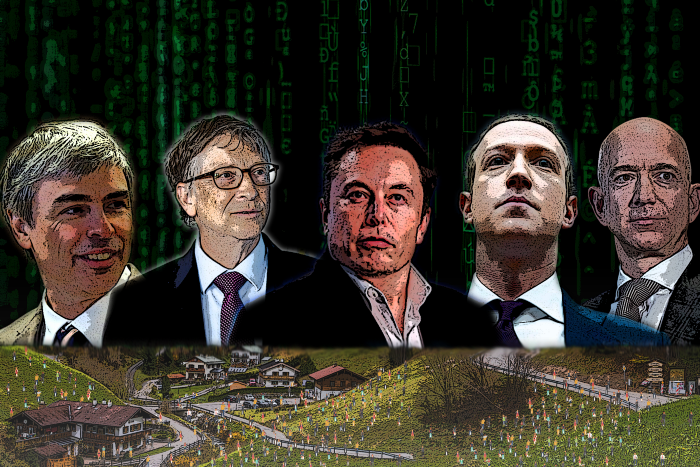EF Schumacher warned us that Small is Beautiful. We ignored his message.
In this time of volatility, let’s reflect on the current structures of society. In more ways than we’d like to admit, our system prioritizes profit over people. This me-first culture has led us to a society that builds machines up rather than families… and we’re at our breaking point.
It is disheartening to acknowledge how the prevailing thinkers of our time have prescribed to the smothered unanimity of technocracy. The global frustration unfolding today is not primarily political, it’s economic… and ultimately philosophical.
Economics as if people mattered
With so much room for innovation and improvement, this is an exciting time to live. We are nearing the tipping point of a soft revolution, where the masses are desperate for alternatives — new faces and new answers.
This thirst for resistance and counterculture is a merely a symptom of our discontent with the current fabrics of society. Technology is peaking, and Big Tech may be solving human boredom, but our devices are poorly failing the human spirit.
Better than ever, still yearning for more
Why are so many people unhappy? Think about how lucky we are. The luxuries of the past have become the necessities of today.
Microwaves, air conditioners, cars, computers — these once novel inventions are ubiquitous objects in the Western home. Our fancy tools and gadgets have afforded us abundant comfort, entertainment and consumption.
The world is literally in the palm of our hands, and ‘living the good life’ has never been so easy. Still, the ‘bread and circuses’ that technology offer us fail to provide a deeper meaning of life rich in spiritual wisdom.
Happy society
We find ourselves in the most complicated, anxious, depressed and lonely civilization in human history. This harsh reality exists whether unemployment is high or low, markets are up or down, whether housing is cheap or expensive.
The modern happiness radar indicates (to me) how the ever record-breaking global economy has reached its final limitation: human emotion. A fundamental shift in what we value, and how we prioritize it, is necessitated to fix it. The idea is not complicated — our needed change is rooted in the age-old maxim of ‘more is less’.
The implementation of this minimalist method of living, on the other hand, is difficult, idealistic, perhaps even Romantic.
The suggestion? Keep the world small. Not separate, not divisive — but small. Here are some old, recycled ideas from Buddhist economics to help us understand why modern man is so unhappy, and how to win our soul back.
The emergence of buddhist economics
I first discovered the term Buddhist Economics in 2016 when I read Small is Beautiful: A Study of Economics As If People Mattered by E.F. Schumacher. Schumacher was a German-British Statistician and Economist who believed in a human-scale, decentralized approach to technological development.
In his book, Schumacher discusses the principles of Buddhist economics and addresses how modern economic thinking causes much of the emotional distress we experience in our 21st-century lives. Yes, the book published in 1973, but it is more relevant today than it was in its time.
Wealth and happiness
Our wealth has increased across the board, but we are no happier as a species. Positive human relationships, shared emotion, fulfilling purpose — these are the tenants of a progressive society.
Drones, phones, face ID, and VR are band-aid solutions for a dispirited population. Schumacher was a visionary. He saw the society’s downward path and tried putting it to a halt.
The spiritual statistician lived in a time made up of relative simplicity without complete technological intrusion. Yet, his words ring true as if he lived to see the day of Amazon, Apple and COVID-19. In fact, off-beat professors gutsy enough to question the monolithic acceptance of globalization still lecture on his principles today.
Here are a few basic principles of EF Schumacher, Small is Beautiful and Buddhist economics:
The Problem of Production
The modern economist is taught to think of ‘labor’ as a necessary evil for economic output. Schumacher discusses the humanization of work in Small is Beautiful, and how our obsession with economic growth blinds us from optimizing work-life balance.
Most view labor as this ugly task that needs to be completed in exchange for money. Thus, any form of automation that can help us move closer to a no-work society is widely praised.
Schumacher, on the other hand, views work as nourishment. Our path to purpose. Apart from family, the relationships we form at work are the foundation of society. If work culture is broken, then society must be broken. If society is dysfunctional, it will lead to dissatisfaction.
That soul-destroying, meaningless, mechanical, monotonous, moronic work is an insult to human nature which must necessarily and inevitably produce either escapism or aggression, and that no amount of ‘bread and circuses’ can compensate for the damage done — these are facts which are neither denied nor acknowledged but are met with an unbreakable conspiracy of silence — because to deny them would be too obviously absurd and to acknowledge them would condemn the central preoccupation of modern society as a crime against humanity.
— EF Schumacher
Appreciate the nature of work to function at an optimal level. Work can enlighten and push us to the most progressive versions of ourselves — where we discover our passions and enhance our personality, rather than dilute it.
‘Complete and repeat’ is the old system of thinking. Let’s write a new script. Finding value in work is an essential part of the sustainability movement. As I discussed in my analysis of self-reliance, we need to find worth in life before we find worth in more grandiose ideas like the health of our species.
Technology with A Human Face
Back to the technocracy and how it relates to Small is Beautiful principles.
Every day, we spend millions of dollars on the ‘next big thing’ — voice-recognition devices, internet of things, VR, AI, 5G, new phones. And where does that take us?
You may feel happy, but the numbers are telling a different tale.
Schumacher proposed a system of thinking that prioritized people over profit, and a complete reshaping of economic development. Remove words like GDP, GNP, and per capita rate — and replace them with happiness index, anxiety metrics, depression indicators. If those were our economic measure tapes, the US would fall dead last in the race.
Intermediate technology
Just because you can build it, doesn’t mean you should. Modern technology has plenty to offer, and our world is living the pinnacle of self-serving indulgence. At what point do we dedicate our development dollars to solve issues of happiness?
Ever bigger machines, entailing ever bigger concentrations of economic power and exerting ever greater violence against the environment, do not represent progress: they are a denial of wisdom. Wisdom demands a new orientation of science and technology towards the organic, the gentle, the non-violent, the elegant and beautiful.
— EF Schumacher
In a society of ‘gigantism’ where we have a few large corporations influencing media, politics, arts, entertainment. Where does this leave the human?
To be a large company is a measure of size not success. Evaluate companies based on overall social good, employee engagement and fulfillment in work, and the annual company rankings may create new winners.
Building ever-larger buildings with ever-larger budgets is an indication that we as a society prefer paychecks over purpose. The cities themselves — emblematic of economic prowess — are not known to be curators of contentment. This problem with modern cities leads us to the observation of economic development through the Buddhist-Schumacher lens.
Economic Development through the Countryside
Modern Economics
We live in the age of the megalopolis. 21st century students of economics are taught and reminded of the importance of urban development in emerging markets. What manifested — countries with concentrated cities and scarcely populated villages.
With the recent oil boom in Guyana, it will be interesting to see how foreign investment treats their largest city of Georgetown. If I had to guess, its population will quadruple in the next 10 years. Schumacher himself warned that a city’s population should not rise above 500,000. That of course has become an unrealistic threshold in 2020. But if we’ve learned anything about his predictions, we may want to consider his point.
A world in cities
Experts predict that 68% of the world will live in cities by the year 2050, more than half already do. It is critical that we understand how to build better cities that exhibit compassion and encourage the pursuit of happiness rather than economic gain. I sound like an idealist, but the warning signs of a disappointed world are hard to ignore. When people are unhappy, the world tends to change. So where specifically does urban economic development go wrong?
It remains an unalterable truth that, just as a sound mind depends on a sound body, so the health of the cities depends on the health of the rural areas. The cities, with all their wealth, are merely secondary producers, while primary production, the precondition of all economic life, takes place in the countryside.
— EF Schumacher
Natural resources are treated like infinite resources, animals are treated like goods, water is treated like a factor of production (rather than a finite necessity) and Nature evolved into some distant fantasy land you visit on the weekend. Without fruitful crops and sustained agriculture, developing cities fail to achieve optimal human happiness.
The country first model
Focusing on the city first — the current development model in the Southern Hemisphere — is not sustainable. A world of cities is a world starved of humans bound by Land. Advanced economies with big cities and large populations like China are industrializing agriculture in large-scale production. That means no more small farms to feed 1.4 billion hungry mouths.
In the city, there are many skilled jobs, but for an unskilled population. Everyone abandons the village for economic opportunity, and there aren’t enough jobs to go around for everyone. So now you have industrialized land with a scarce population — and overpopulated cities
In a world where dollars are in the ‘country first’, fewer cities would become crowded in the first place. The farms wouldn’t lose the young, able-bodied workers, and most citizens would be qualified to join the economic boom in farming. If the industrialization of agriculture became earth-conscious, diversified, and innovative, the modern city would be harmonious with a healthier future.
Let’s learn the lessons of our past and present through Small is Beautiful. We can start building cities with that appreciation for nature in mind. Not for some Romantic hippie-induced utopia, but for the sake of the rational economic mind.













No Comments